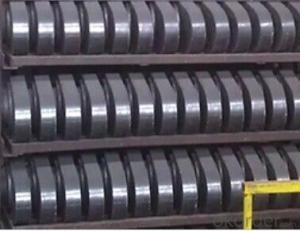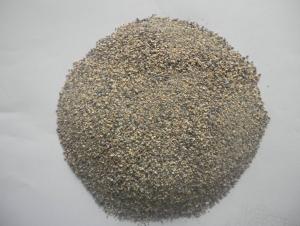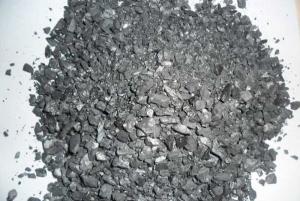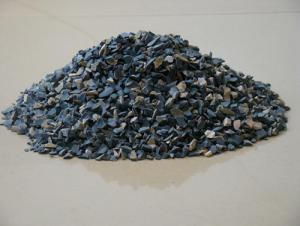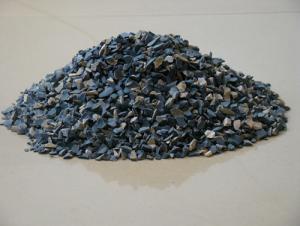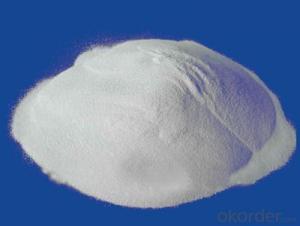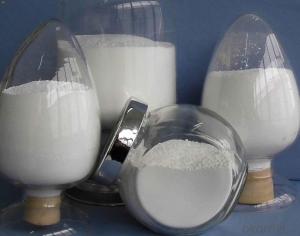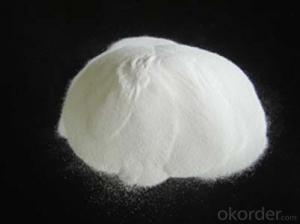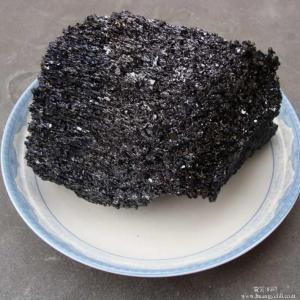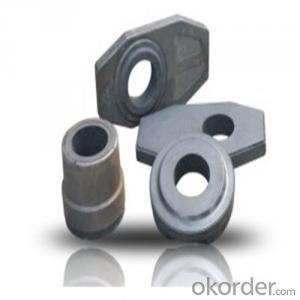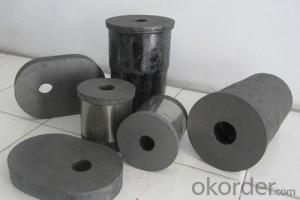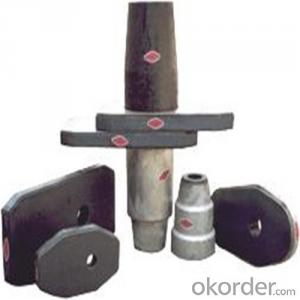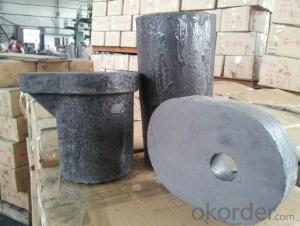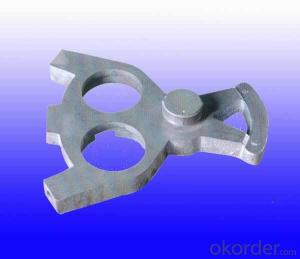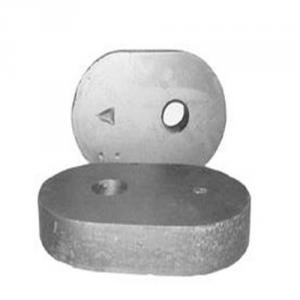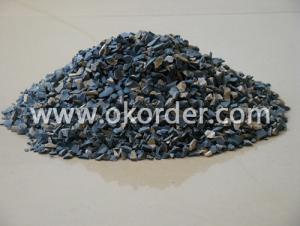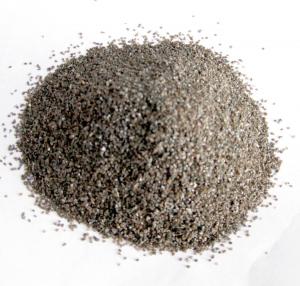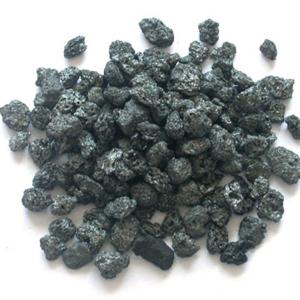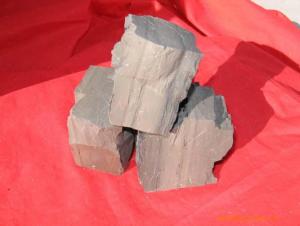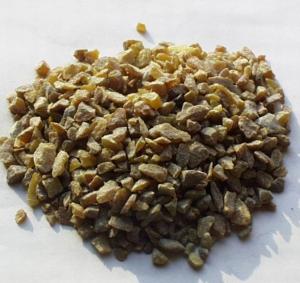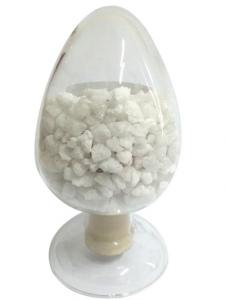Fired Tabular Alumina Slide Gate Plate for Ladle Refractory
- Loading Port:
- Qingdao
- Payment Terms:
- TT OR LC
- Min Order Qty:
- 500 m.t.
- Supply Capability:
- 5000 m.t./month
OKorder Service Pledge
OKorder Financial Service
You Might Also Like
Slide gate plate--Model: 1QC 2QC, 1BK,2BK, C51. LQ60/80/, LS50/70/90, LQLG20 21 22(VSV374 421 441)FLOCON 4200/6300/ B50/250, LQLV50/150/180 ....
Special Steel (Ca-treatment steel)------Al-Spinel ; Mg Spinel .
2. Service Result for slide gate plate:
Service life depends on the Different Raw Material and Production Process of Slide Gate Plate. Such as Firing Temp, Oil immersion, Drying Temp. and so on.
3. Type of production design
1) High Temperature Burnt Slide Gate Plate
High preformance ladle slide gate plate refractories adopts tabular alumina, carbonaceous material and zirconia-containing material as main raw materials, adds in high performance antioxidants, uses phenolic resin as binder, formed under high-pressure and burned under high temperature. Mainly used in large and medium-sized ladles.
2) Low Temperature Burnt Slide Gate Plate
Tabular alumina, zirconia-containing material and spinel as major raw materials, adding in special metal, using phenolic resin as binder, being burned under low temperature to produce the products, Mainly used in small and medium-sized ladle.
3) Unburned Slide Gate Plate
Without the process of burned, tar impregnated and distilled, simple processing. Mainly used in small and medium-sized ladle.
Advantage of slide plate
Our Slide Gate Plate refractory adopts HIgh quality bauxite materiao , also takes tabular alumina, carbonaceous material and zirconia-containing material as main raw materials, adds in high performance antioxidants, uses phenolic resin as binder, formed under high-pressure and burned under high temperature. The slide plates have the advantages of high strength, good erosion resistance, thermal shock resistance and good stability etc., mainly used in large and medium-sized ladle.
C series Slide Gate Plate ---mainly for Indonesia, Vietnam, Myanmar, Thailand, for 5-20 tons ladles.
1QC 2QC Slide Gate Plate mainly for India, Turkey, Iran, Indonesia, Pakistan, Italy , mainly for 20-30 tons ladles.
B250 , safllow, HB250 Slide Gate Plate , Mainly for Pakistan, Iran markety\.
Flocon sereis Slide Gate Plate mainly for Turkey, Iran, Italy, Braizl, and soon.
LQCS Serise Slide Gate Plate mainly for Europe countries. mostly for larges ladles such as more than 120 tons
- Q: Are the specification of fireclay bricks and ordinary clay brick the same?
- Do you want to know whether the specifications of fireclay bricks and ordinary clay brick are the same?
- Q: What kind of material is refractory fiber?
- Refractory fiber, also known as ceramic fiber, is fibrous thermal insulation refractory. It has the characteristics of ordinary fibers, such as softness, flexibility, having a certain tensile strength. And it can be further processed into a variety of products such as paper, wire, rope, tape, blankets and felts.
- Q: What material is refractory material?
- alumina refractory concrete, silica brick clay brick, metal ceramic, high temperature machine coating fiber reinforced ceramics, diatomite product, asbestos products, insulation board refractory. The definition of refractory can be searched in the website.
- Q: What's the classification of refractory material?
- Magnesium aluminum is complex and mainly seeing what classification standard is like according to the appearance shape can be divided into two categories, setting and not setting according to the acid alkali can be divided into acidic, magnesia, high aluminum, ramming expected, spinel, spray coating, plastic, just the quality of the jade, daub material according to the chemical composition is divided into, such as clay, neutral and alkaline according to the operation mode can be divided into different castable, magnesium, calcium, magnesium chrome
- Q: how to classify Insulating Refractory ?
- Low-temperature thermal insulation materials (less than 600 degrees Celsius): medium temperature thermal insulation materials such as diatomaceous earth, asbestos tile (600-1200 degrees C): high temperature thermal insulation material vermiculite, light clay bricks(greater than 12,000 degrees Celsius): Lightweight corundum brick raw materials: Clay, high aluminua, silica, magnesia
- Q: What are the requirements for fire?rating of construction suspended ceiling material ?
- In fireproof design of all parts in interior decoration, fireproof design of suspended ceiling is the most important. Because the flame is burning up in fire and the suspended ceiling is the first and most direct part to test fire; at the same time, it has a direct impact on the evacuation. Therefore, in indoor suspended ceiling decoration design, fireproof work should be considered fully. Code of fire prevention design of interior decoratio of buildings has detailed provisions for fireproof?performance of indoor suspended ceiling materiial of different civil buildings. Suspended ceiling (sprung roof) refers to the top decoration of a house. Suspended ceiling, an important sub-project in construction decoration project, and the hidden layer of electrical equipment, ventilation and air condition, communication and fireproof, alarm pipelines, etc. has the functions of thermal insulation, sound insulation and absorption. Suspended ceiling plays an important role on the entire house decoration. Proper decoration to the house top surface, can not only beautify indoor environment, but also create a colorful interior artistic image. When choosing decoration materials and design of suspended ceiling, you should follow the principle of saving material, being solid, safe, beautiful and practical.
- Q: Who knows about the types of Dalian thermal insulating and refractory materials?
- There are mainly following types: rock wool series, rubber and plastic series, glass wool series, mesh series, ventilation series, mortar series, extruded sheet series, geothermal series, insulation supporting pin series, glass silk cloth series. I hope my answer can help you.
- Q: Is there a worker in (Jigang refractory plant)?
- Ha ha, base should be rest, you won't give you money, Hugh or those money, endlessly is your dedication. Should be double cease, ah, how do you say four days?. In theory, it's five days off now, and the three day of that is from the chairman to every employee.
- Q: How to classify fire resistance rating of brick-concrete structure?
- In order to ensure the safety of the building, the fire protection measures must be taken to make it have a certain degree of fire resistance, even if there is a fire, it will not cause too much damage. According to the national conditions of our country, and in the light of other countries standards, < high-rise civil building fire protection design specification > defines fireproof rank of high-rise civil buildings into level one and two; < code for fire protection design of buildings > divides the rank into level one, two, three, four, level one is the highest level, level four is the lowest. Besides that the minimum fire resistance of the building component is specified, buildings of fire resistance rating also specified requirements for combustion performance. Because the component with the same fire resistance limit is different, it is different in the fire.According to our country national standard < building design fire protection code >, the fire resistance rating of the building is divided into four levels. The fire resistance of a building is determined by the combustion performance and fire resistance of building components (such as beams, columns, floors, walls, etc.). Generally speaking, the fire resistance building of level one is a mixed structure of reinforced concrete structure or a mixture of brick wall and steel concrete structure; the fire resistance building of level two is a mixed structure of steel truss structure, reinforced concrete column and brick wall; the fire resistance building of level three is brick-wood structure made of wood roof and brick wall; the fire resistance building of level four is combustible structure which is composed of wood roof and non-combustible wall.
Send your message to us
Fired Tabular Alumina Slide Gate Plate for Ladle Refractory
- Loading Port:
- Qingdao
- Payment Terms:
- TT OR LC
- Min Order Qty:
- 500 m.t.
- Supply Capability:
- 5000 m.t./month
OKorder Service Pledge
OKorder Financial Service
Similar products
Hot products
Hot Searches
Related keywords
